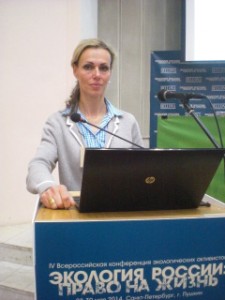
Working to discern patterns of environmental disinformation in an online world
For the past eight years, disinformation has dominated news around elections all over the world. Despite this, it is still a widely misunderstood con...
News

Publish date: June 1, 2015
News
ST. PETERSBURG – Planet of Hopes, an advocacy group for South Urals residents affected by radioactive contamination from the Mayak Chemical Combine, was last week fined 300,000 rubles ($6,000) for failing to register itself as a “foreign agent” under Russia’s NGO laws.
A magistrate court also imposed another 10,000 ruble ($200) fine on the NGO for not filing its documents with the Ministry of Justice on time, according to the RAPSI Russian legal news agency.
The group was initially forced onto the Russian Justice Ministry’s list of foreign agents on April 15 for receiving a $44,188 grant in 2008, four years before the 2012 law on NGO’s even took effect. The grant came from the US-based National Endowment for Democracy.

The Planet of Hope’s, also known as Planeta Nadezhd, is the 53rd of 67 Russian NGOs to end up on the “foreign agents” list since the Justice Ministry was in June give broad powers by president Vladimir Putin to name foreign agents on its own.
The group is also one of 10 environmental NGOs on the foreign agent list, including the anti-nuclear Ecodefense and Bellona Murmansk.
The hearing resulting in the fines against Plant of Hopes took place in a court in the Southern Urals’ closed nuclear city of Ozersk, the hometown of the notoriously polluting Russian nuclear fuel reprocessing site at Mayak.
The 15-year-old NGO’s and its director Nadezhda Kutepova have devoted their energies to defending the ecological rights of citizens of the Chelyabinsk Region, especially those afflicted by radiation hazards.
According to court documents, the organization was last week found guilty of “violations governing non commercial organizations fulfilling the activities of a foreign agent,” and was thus fined.
“We believe the ruling is groundless because there was no legitimate reason to include this NGO in the registry of foreign agents. We will appeal the ruling at the Ozyorsk City Court,” the group’s lawyer Andrei Lepekhin told RAPSI.
Planet of hopes long a target of official harassment
The fines and foreign agent status are not the first examples of harassment of the organization.
In 2004, the Federal Security Service (FSB), the KGB’s successor organization, accused Planet of Hopes of supposedly creating a negative international opinion of Russia. The group conducted a detailed study of Ozersk’s residents on issues like the local environment and human rights, which the FSB sought to suppress.
The group was also accused of tax evasion in 2008, but was able to beat the charges in court.
Defending against legacy disasters
Planet of Hopes maintains a special focus on those affected by 1957’s so-called Kyshtym disaster when a waste storage tank at Mayak exploded, spreading radioactivity throughout the Chelyabinsk region, contaminating some 23,000 square kilometers and forcing 17,000 to evacuate.
It was dubbed the Kyshtym disaster by Soviet nuclear authorities to divert attention to a neighboring town where they said a conventional power plant had exploded.
Thousands – included children and pregnant women – were press-ganged into cleaning up the nuclear fallout with little more than rags. The legacy remain today in highly irradiated land, elevated cancer rates and deaths and birth deformities.
Still thousands more today continue to suffer from Mayak’s past dumping of radioactive waste into the Techa River and surrounding water bodies.
In 2011, a six-year-old boy and grandson of on of the original liquidators of the Kyshtym disaster, died of a radiation related cancer.
Planet of Hopes work also consists of fighting for compensation from the state and the Mayak Combine itself for victims of radiological illnesses and deaths.

For the past eight years, disinformation has dominated news around elections all over the world. Despite this, it is still a widely misunderstood con...

A ruling by the European Free Trade Association Court that Norway’s continental shelf falls under the European Economic Area Agreement could dramatic...

Bellona held a seminar on countering Russian disinformation in the Arctic at the Arctic Frontiers international conference in Norway

Our December Nuclear Digest, reported by Bellona’s Environmental Transparency Center, is out now. Here’s a quick taste of three nuclear issues arisin...